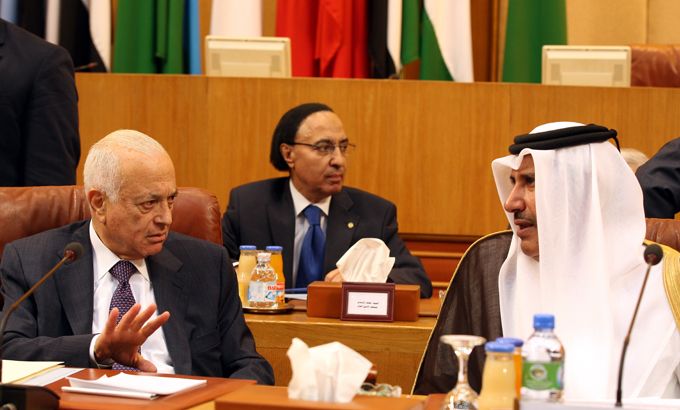Syria agrees to Arab League plan
Arab foreign ministers meeting in Cairo announce Damascus’s acceptance of proposals aimed at easing protest crackdown.

The Syrian government has accepted several measures suggested by the Arab League aimed at halting the violence in the country, including the removal of tanks and armoured vehicles from the streets.
The breakthrough was announced at an emergency meeting in Cairo on Wednesday, where the regional body gathered to discuss plans to ease the violence and end the unrest in Syria.
“The Arab League welcomes the Syrian government’s agreement to the Arab plan,” a statement by the Arab League said.
 |
It “emphasised the need for the immediate, full and exact implementation of the articles in the plan”.
Speaking after the meeting in the Egyptian capital, Sheikh Hamad bin Jassim Al Thani, the Qatari prime minister, said: “We are happy to have reached this agreement and we will be even happier when it is implemented immediately.”
He read out a statement saying Syria had a agreed on several points including a complete halt to violence, the release of prisoners, removing the military presence from cities and residential areas, and allowing the Arab League and media access to report on the situation.
He said the group would continue contacts between the Syrian government and the opposition “in preparation for a national dialogue within two weeks”.
‘Remarkable commitment’
Al Jazeera’s Jane Arraf, reporting from Cairo, said: “The Arab League secretary-general is calling this a paradigm shift in recent relations with Syria, which has huge concerns not just for Syria’s neighbours but for the entire Arab community.
“[The Arab League] essentially don’t have any guarantees, but what they do have is quite a remarkable commitment from Syria to adhere to several points of a ceasefire which it had previously resisted.”
Soon after the Cairo announcement, the US administration repeated its call for Assad to step down.
“Our position remains that President Assad has lost his legitimacy to rule and should step down,” Jay Carney, the White House press secretary, said.
“We support all international efforts that are aimed toward convincing the regime to stop attacking its own people.”
Victoria Nuland, the US state department spokeswoman, said that the US administration was waiting to see the details of the Arab League agreement with Syria, but warned that Assad’s government has a long track record of broken pledges.
“We’re not going to judge them by their words. We’re going to judge them by their actions,” she told reporters in Washington.
“There is a risk here that they are trying to string out diplomacy, that they are trying to offer their own people half steps or quarter measures rather than taking the real steps.”
Earlier in the day, Ban Ki-moon, the UN chief, demanded an immediate end to what he called the Syrian government’s crackdown on civilian protesters.
“Killing civilians must stop immediately in Syria,” he said in the Libyan capital Tripoli. “People have suffered to much for too long and it’s an unacceptable situation.”
Najib al-Ghadban, a member of the opposition Syrian National Council, said implementation of the initiative sponsored by the League would mean the end of the regime and Assad was not likely to let that happen.
`”What happened today is an attempt to buy more time,” al-Ghadban told reporters.
“This regime is notorious for maneuvering and for giving promises and not implementing any of them.”
Louay Safi, also a member of the SNC, voiced scepticism over Damascus’s acceptance of the plan, saying the government has a long history of playing “games”.
“To accept the peace agreement, the Syrian government must acknowledge that there is a problem, that there is a popular revolt and there is a demand to take note of the demands of the people. But it hasn’t done so,” he told Al Jazeera.
“If the regime pulled out its forces from the streets, released all of the around 40,00 prisoners, and showed real signs that it is going to change course, then that could lead to different thinking.”
Roadblock killings
Wednesday’s statements came as Syrian pro-democracy activists reported the deaths of at least 21 people in the country. This included 13 factory workers killed in a village northwest of Homs.
The victims were stopped at a roadblock, where they were shot by forces loyal to President Bashar al-Assad, the activists said.
“They were workers at a small building blocks factory,” Ahmad Fouad, a Homs-based activist, told the Reuters news agency by phone.
“The exact time of their death is not known, but it appears it was this morning,”
Al Jazeera was unable to verify independently the reports of the killings.
An activist submitted a Youtube video, purportedly shot in the village of Kfar Laha, that showed several bodies, gagged and with their hands tied behind their backs.
Kfar Laha, in the Houla region, is considered a centre for protests against Assad’s government. The region is also home to an armed opposition movement.
The alleged killings of those opposed to the Syrian government follow online claims that nine members of Assad’s Alawite sect had been dragged from a bus and then shot by assailants in Homs province.
The claims were made by an activist out of Homs and on a social-networking site supportive of the Assad government.
Omar Idlibi, a prominent activist in exile in Beirut, told Reuters that the circumstances of Tuesday’s bus incident remained unclear. However he did say that the shooting occurred near a main army roadblock in Homs.
It is suspected that Wednesday’s attack on the villagers was a revenge attack following the incident on Tuesday.